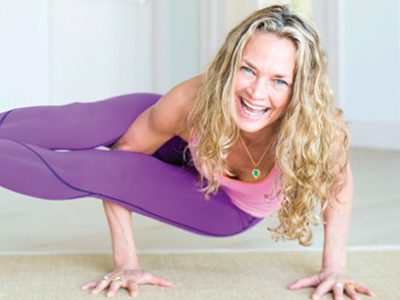 “Our deepest fear is not that we are inadequate,” Marianne Williamson once noted in A Return to Love. “Our deepest fear is that we are powerful beyond measure. We ask ourselves, ‘Who am I to be brilliant, gorgeous, talented, fabulous?’ Actually, who are you not to be?” From Yoga for Life: A Journey to Inner Peace and Freedom.
“Our deepest fear is not that we are inadequate,” Marianne Williamson once noted in A Return to Love. “Our deepest fear is that we are powerful beyond measure. We ask ourselves, ‘Who am I to be brilliant, gorgeous, talented, fabulous?’ Actually, who are you not to be?” From Yoga for Life: A Journey to Inner Peace and Freedom.
All the women in my family start menopause early. At forty-two, I was deep in the throes of hot flashes and night sweats. I'm sure some people would have described me as cranky and emotionally erratic, but the truth is I just didn't feel like putting up with stuff I'd always put up with anymore. I spoke up, when previously I would have stayed quiet. Relationships that relied on my being the voiceless pretty girl came to an end—or changed radically. I don't think it was a coincidence that I fell in love with Rodney and left my marriage around the same time I began to go through menopause. By the time women get to menopausal age, we're generally less inclined to go along with the roles society has set forth for us. Our energetic currents are powerful at this age, which drives change. My friend, women's-health-and-wellness physician Christiane Northrup, calls this time "the lifting of the long hormonal veil." It can be both liberating and unsettling.
Menopause is a breakthrough, not a crisis or an illness. Rather than thinking of it as losing our fertility, our looks, and our purpose in the world, we need to recognize it as the time to step into our wisdom, to find our voices and our truth. There are more than 500 million postmenopausal women in the world—more than 50 million in the United States alone. I'd put money on the likelihood that many of us make major life changes at this juncture.
My shifts at midlife were all-inclusive. My sense of smell became much more acute, and smells that I used to love—perfumed moisturizers, scented candles—now turned my stomach. I craved cheese and eggs. Before menopause, my sex drive was associated with my ovulation cycle and would kick into high gear when my body was ripe for pregnancy. After menopause, sex became more about seduction, sensuality, and pleasure. Even my walk changed: Before menopause, I used to prance on my toes, like a puppy wanting to please its master. After, I walked heel to toe, and according to close friends and family, with a sort of swagger. I wasn't in such a hurry to please.
I cared less about what other people thought about me. And yet I found I needed the support of other women. When my marriage ended and my relationship with Rodney became public, my mom, sister, and dear friend Aida were my confidantes. As women, they could understand my aching heart.
Women need women. We need to be able to put down our burdens and fall apart, and we can do this with other women. When men aren't around, liberation takes place. Competition diminishes, and we feel supported in whatever we're going through.
Transformation occurs when women sit with one another for any length of time. Throughout history, we have done this—in sewing circles, menstrual huts, even on playgrounds. These days, we're so busy being superwomen we rarely make time for girlfriends. There's so much value in gathering to talk, laugh, and cry.









